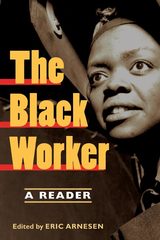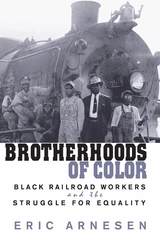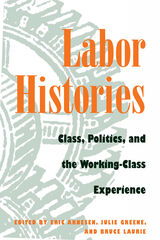
Uniting the latest scholarship on race, labor, and civil rights, The Black Worker aims to establish the richness of the African American working-class experience, and the indisputable role of black workers in shaping the politics and history of labor and race in the United States.
To capture the complexity of African Americans’ experiences in the workplace, this reader examines workers engaged in a wide array of jobs, including sharecropping, coal mining, domestic service, longshoring, automobile manufacturing, tobacco processing, railroading, prostitution, lumbering, and municipal employment. The essays’ subjects include black migration, strikebreaking, black conservatism, gender, and the multiple forms of employment discrimination in the South and North. Other contributions deal explicitly with state policy and black workers during the transition from slavery to freedom, World Wars I and II, and the 1960s.
The variety of challenges made by these workers, both quiet and overt, served as clear reminders to the supporters of white supremacy that, despite their best efforts through violence, fraud, and the law, as long as they insisted on racial inequality, the “race question” would never be fully resolved.
Contributors: Eric Arnesen, Beth Tompkins Bates, Cynthia M. Blair, Tera W. Hunter, William Powell Jones, Brian Kelly, Robert Korstad, Nelson Lichtenstein, Joseph A. McCartin, Steven A. Reich, Leslie A. Schwalm, Nan Elizabeth Woodruff

From the time the first tracks were laid in the early nineteenth century, the railroad has occupied a crucial place in America's historical imagination. Now, for the first time, Eric Arnesen gives us an untold piece of that vital American institution—the story of African Americans on the railroad.
African Americans have been a part of the railroad from its inception, but today they are largely remembered as Pullman porters and track layers. The real history is far richer, a tale of endless struggle, perseverance, and partial victory. In a sweeping narrative, Arnesen re-creates the heroic efforts by black locomotive firemen, brakemen, porters, dining car waiters, and redcaps to fight a pervasive system of racism and job discrimination fostered by their employers, white co-workers, and the unions that legally represented them even while barring them from membership.
Decades before the rise of the modern civil rights movement in the mid-1950s, black railroaders forged their own brand of civil rights activism, organizing their own associations, challenging white trade unions, and pursuing legal redress through state and federal courts. In recapturing black railroaders' voices, aspirations, and challenges, Arnesen helps to recast the history of black protest and American labor in the twentieth century.


READERS
Browse our collection.
PUBLISHERS
See BiblioVault's publisher services.
STUDENT SERVICES
Files for college accessibility offices.
UChicago Accessibility Resources
home | accessibility | search | about | contact us
BiblioVault ® 2001 - 2024
The University of Chicago Press









